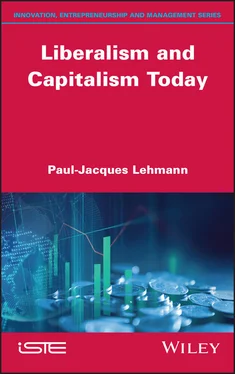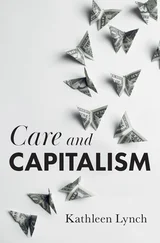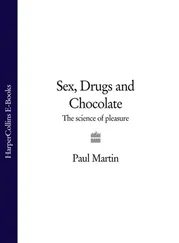6 PART 2: The Evolution of Liberalism and Capitalism
3 The Birth of a New Capitalism in a New World: Financial Capitalism
3.1. The emergence and development of financial capitalism
3.2. Changes in corporate governance
3.3. New economic policies
3.4. From the perfection of theoretical capitalism to the crises of real capitalism
3.5. Recurrent causes of the crises of capitalism
3.6. Some examples of crises of capitalism
4 Towards 21st Century Capitalism
4.1. A responsible and proactive economic policy
4.2. Finance that respects the principles of capitalism
4.3. Renewed corporate governance
7 Conclusion
8 References
9 Index
10 End User License Agreement
1 Cover
2 Table of Contents
3 Title Page
4 Copyright First published 2021 in Great Britain and the United States by ISTE Ltd and John Wiley & Sons, Inc. Apart from any fair dealing for the purposes of research or private study, or criticism or review, as permitted under the Copyright, Designs and Patents Act 1988, this publication may only be reproduced, stored or transmitted, in any form or by any means, with the prior permission in writing of the publishers, or in the case of reprographic reproduction in accordance with the terms and licenses issued by the CLA. Enquiries concerning reproduction outside these terms should be sent to the publishers at the undermentioned address: ISTE Ltd 27-37 St George’s Road London SW19 4EU UK www.iste.co.uk John Wiley & Sons, Inc. 111 River Street Hoboken, NJ 07030 USA www.wiley.com © ISTE Ltd 2021 The rights of Paul-Jacques Lehmann to be identified as the author of this work have been asserted by him in accordance with the Copyright, Designs and Patents Act 1988. Library of Congress Control Number: 2021934587 British Library Cataloguing-in-Publication Data A CIP record for this book is available from the British Library ISBN 978-1-78630-689-0
5 Introduction
6 Begin Reading
7 Conclusion
8 References
9 Index
10 Other titles from iSTE in Innovation, Entrepreneurship and Management
11 End User License Agreement
1 v
2 iii
3 iv
4 ix
5 x
6 xi
7 xii
8 1
9 3
10 5
11 6
12 7
13 8
14 9
15 10
16 11
17 12
18 13
19 14
20 15
21 16
22 17
23 18
24 19
25 20
26 21
27 22
28 23
29 24
30 25
31 26
32 27
33 28
34 29
35 30
36 31
37 32
38 33
39 34
40 35
41 36
42 37
43 38
44 39
45 40
46 41
47 42
48 43
49 44
50 45
51 46
52 47
53 48
54 49
55 50
56 51
57 52
58 53
59 54
60 55
61 56
62 57
63 58
64 59
65 60
66 61
67 62
68 63
69 64
70 65
71 66
72 67
73 68
74 69
75 70
76 71
77 72
78 73
79 74
80 75
81 76
82 77
83 78
84 79
85 80
86 81
87 82
88 83
89 84
90 85
91 86
92 87
93 89
94 91
95 92
96 93
97 94
98 95
99 96
100 97
101 98
102 99
103 100
104 101
105 102
106 103
107 104
108 105
109 106
110 107
111 108
112 109
113 110
114 111
115 112
116 113
117 114
118 115
119 116
120 117
121 118
122 119
123 120
124 121
125 122
126 123
127 124
128 125
129 126
130 127
131 128
132 129
133 130
134 131
135 132
136 133
137 134
138 135
139 136
140 137
141 138
142 139
143 140
144 141
145 142
146 143
147 144
148 145
149 147
150 148
151 149
152 150
153 151
154 152
155 153
156 154
157 155
158 156
159 157
160 158
161 159
162 160
163 161
164 162
165 163
166 164
167 165
168 166
169 167
170 168
171 169
172 170
173 171
174 172
175 173
176 174
177 175
178 176
179 177
180 178
181 179
182 180
183 181
184 182
185 183
186 184
187 185
188 187
189 188
190 189
191 190
192 191
193 192
194 193
195 194
196 195
197 196
198 197
199 198
200 199
201 201
202 202
203 203
204 204
205 205
206 206
207 207
208 208
209 209
210 210
211 211
212 212
213 213
214 214
215 215
216 216
Liberalism and Capitalism Today
Paul-Jacques Lehmann

First published 2021 in Great Britain and the United States by ISTE Ltd and John Wiley & Sons, Inc.
Apart from any fair dealing for the purposes of research or private study, or criticism or review, as permitted under the Copyright, Designs and Patents Act 1988, this publication may only be reproduced, stored or transmitted, in any form or by any means, with the prior permission in writing of the publishers, or in the case of reprographic reproduction in accordance with the terms and licenses issued by the CLA. Enquiries concerning reproduction outside these terms should be sent to the publishers at the undermentioned address:
ISTE Ltd
27-37 St George’s Road
London SW19 4EU
UK
www.iste.co.uk
John Wiley & Sons, Inc.
111 River Street
Hoboken, NJ 07030
USA
www.wiley.com
© ISTE Ltd 2021
The rights of Paul-Jacques Lehmann to be identified as the author of this work have been asserted by him in accordance with the Copyright, Designs and Patents Act 1988.
Library of Congress Control Number: 2021934587
British Library Cataloguing-in-Publication Data
A CIP record for this book is available from the British Library
ISBN 978-1-78630-689-0
When you have a book on capitalism and liberalism in your hands, most of the time, you find yourself faced with a debate based either on a panegyric praising the benefits of these two systems or on a purely critical ideology and hackneyed arguments that have been heard many times. Our objective is different: first, we will show how these systems appeared historically, then examine their evolution over time up to the present day, both in terms of their advantages and their dysfunctions.
Indeed, we can only understand the present by drawing on the past. However, we know that the explanations concerning the circumstances in which liberalism and capitalism emerged and developed are numerous and the object of these interpretations is often contradictory. The choice made in this book was not to present, compare and contrast all these analyses. It is obviously subjectable to criticism and will be criticized because it is based on numerous demonstrations. It seemed interesting to us to refer to causes, mostly economic, but also historical, political, legal and sociological causes.
For this, we have essentially called upon two authors recognized in all these fields: first, the Frenchman Alexis de Tocqueville 1 , followed by someone who is considered his successor, the Austrian Max Weber 2 . These forerunners of sociology, as well as historians and politicians, used this nascent science to explain the history of humanity and, thus, also of liberalism and capitalism. Moreover, both had the advantage, certainly, of being liberals in the political domain, but “troubled” moderate liberals, according to Raymond Boudon 3 , in the economic domain; they were favorable a priori to capitalism, but did not hide their questions in the face of the already present drifts of this system in their time, for which they foresaw, with lucidity, an acceleration of the pitfalls in the future. We will also touch on the economic explanations of the first liberals, in particular Adam Smith, and of more contemporary authors, for example Schumpeter and Hayek, who refer to modern liberalism and capitalism.
Читать дальше













